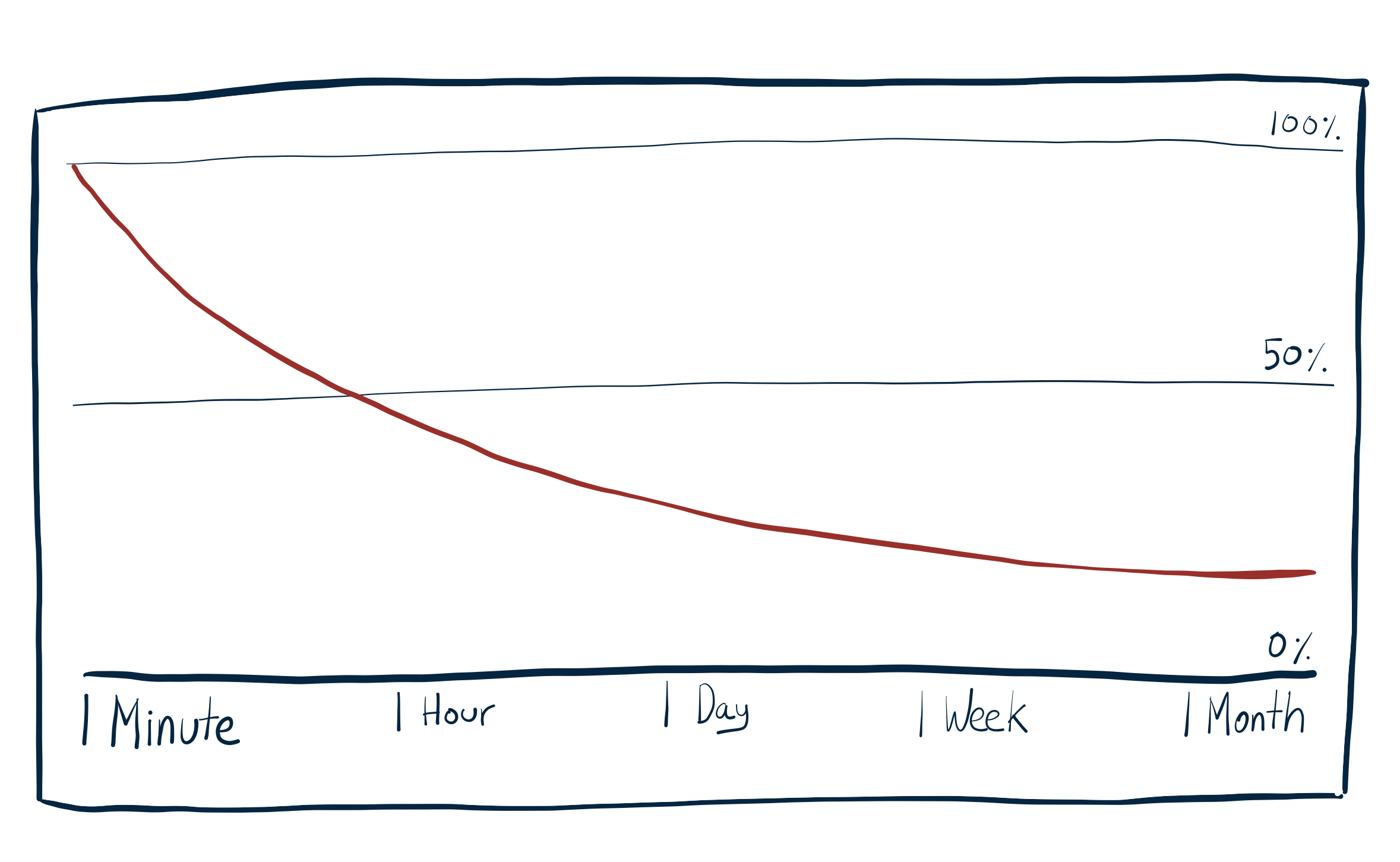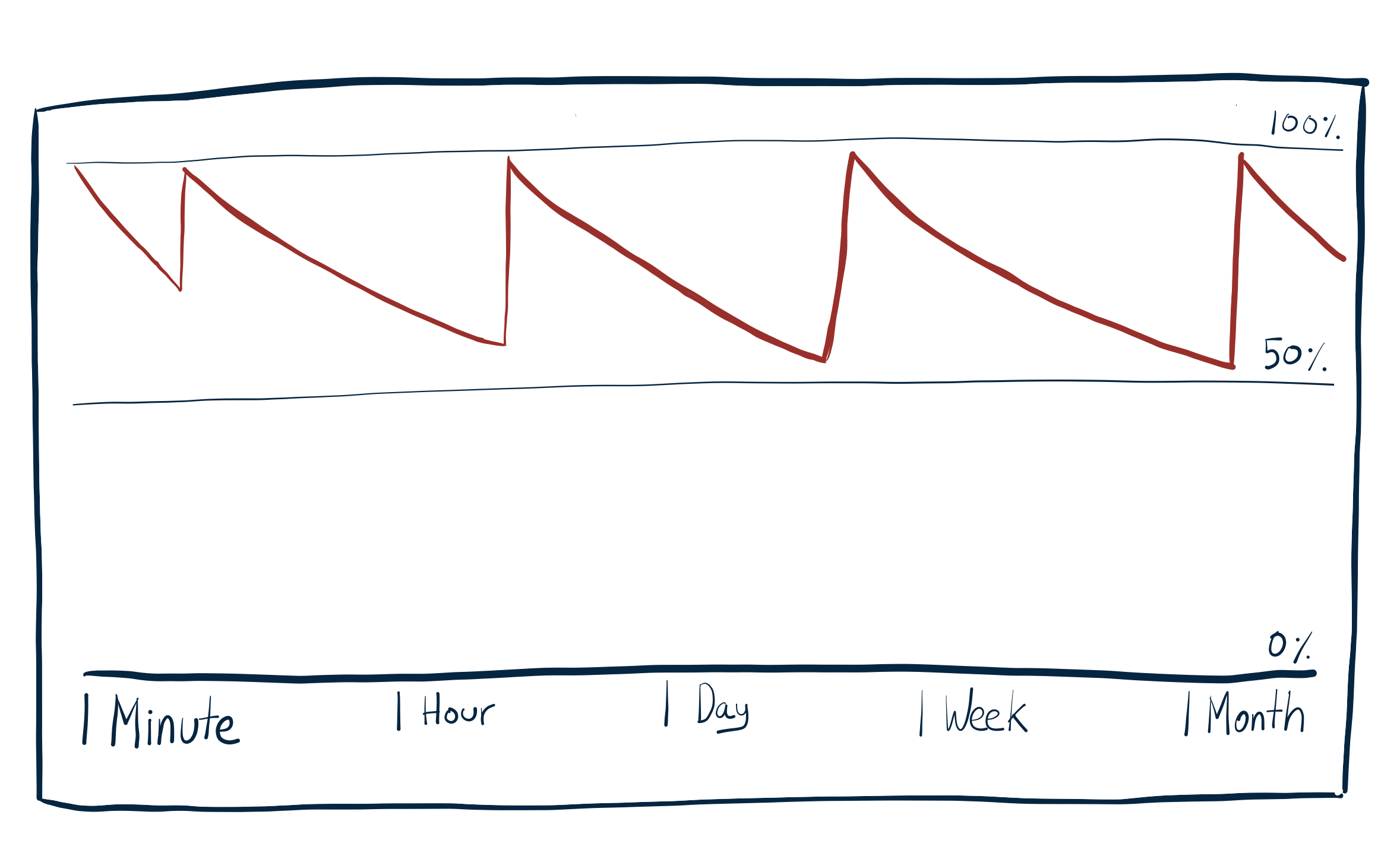Spaced Repetition for Infinite Memory
Anything worth learning is worth keeping in your memory. Spaced repetition is the science-informed answer to the problem of the forgetting.

For all the effort we put into cramming new knowledge into our simian brains, we don't seem very concerned about the rate knowledge falls out of them.
It's an unspoken tragedy how little we remember from the first two decades of our lives, when we had both the time and the environment conducive to learning. We know we spent an entire semester in a particular class, can remember the classmates, the mannerisms of the teacher, but nothing about the actual content.
After the responsibilities of adulthood make it harder to find the leisure needed to learn something, we tend to get a little more protective of knowledge. To forget four years of language school in high school is acceptable, almost expected. But having peered into a brain which once contained knowledge and finding only vague memories, an adult learner should be weary of letting it happen again.
If we don't want to live a life where only the emotionally impactful memories and daily-use knowledge sticks with us, we need a strategy.
Graphing forgetfulness
In the 1880s, psychologist Hermann Ebbinghaus sought to understand the factors affecting the rate at which we forget things. Among his contributions was the forgetting curve, showing that we tend to forget half of our learned material within days or weeks. Recent studies show that about 75% of learned material is gone within 48 hours.

That's fine if you're cramming for a test on a subject you don't care for, but how can you stop this for valuable knowledge?
Reviewing.
Not only does reviewing restore your knowledge to 100% for a fleeting moment, the rate of forgetting decreases after each review.
By the time you've reviewed material four times, it will decay in your memory very slowly and many facts will stick for good.
So let's just review four times in a week and enjoy a much longer retention period, right?
Optimal review times
One of Ebbinghaus's proposals was that if we want to remember things longer, the timing of reviews is critical. This was extended on by another German named Sebastian Leitner who developed a method of spaced repetition using flashcards.
Spaced repetition is what makes it all work.
The optimal time to review a learned fact is when you are beginning to forget it. If you review too quickly, the review doesn't extend your memory in a meaningful way. If you review too late, you've forgotten it already and must learn it again.
Reviews should be hard. You know you've hit the optimal period between reviews when you say "Ooh, I know this one I know this one... Michael Dukakis!"
How do you know when that time is? And what's more, given 10 newly-learned facts, some will effortlessly be remembered in 48 hours, some you will struggle to remember even 15 minutes later. How can we handle the complexity of tracking each review period individually?
Here we are indebted to computers in general and the authors of SuperMemo specifically. SuperMemo is a flashcard software developed in the 80's. Its major contribution was an algorithm which chose an appropriate review time given your performance on each fact, and a database to keep track of those review times and present facts at the right moment.

Unlike paper flashcards, when you review a fact you must self report your performance. Did you forget the fact completely? Did you remember after some difficulty? Or was it so simple that you spat out the answer immediately?
Based on this and the previous review period, the next review period is adjusted. If a fact you hadn't reviewed for a week was remembered easily, it might not be reviewed for a month. But if a month later you see that fact and forget it completely, the review period is set back to a few hours.
A disciplined approach to study
The basics of the SuperMemo approach to spaced repetition have stood the test of time and are now implemented in many other software products (including ones I have built).
The tools are out there, but they won't do the work for you.
Incorporating spaced repetition in your own lifestyle requires some work to set up. And even after setting up the system, each day of reviews takes willpower to get through. Because reviews are meant to occur at a challenging moment, a review session is not easy. If you're accustomed to a breezy learning experience followed by prompt forgetting, this will feel very different.
Choose your software
There are a number of generic flashcard software out there, such as SuperMemo, Mnemosyne, Anki, Memrise...
You'll also find these flashcards wrapped up in the package of a particular domain. Language learning vocabulary is popular. So is test prep software. Generally the flashcard implementation is the same, but you are using them for prepopulated data.
I prefer generic software because I strongly advocate making your own cards. Downloading a pack of the 2000 highest frequency words in a language is a tempting way to start, but the most useful cards will be the knowledge you choose to study, resembling the situations you'd like to use them.
Make the cards
Your goal is to model the situations you'd like to transfer this knowledge in real life.
Imagine you are studying medicine. You could very well make a card which says "Crohn's disease" on one side and "An inflammatory bowel disease that results in the body's immune system attacking the gastrointestinal tract." You could then test both sides, meaning that you prompt yourself with the name and try to remember the description, and vice versa.
But what if you want to use this knowledge for making diagnoses? Unless you are studying for a test, that is a bit more practical than being able to quickly define a disease by name.
In that case, you could make a card where the prompt is a list of symptoms and the answer is "Possibly Crohn's disease". In real medicine, you can't be completely sure based on a list of symptoms and there might even be other root causes that could create the same symptoms.
Instead of shying away from this ambiguity, embrace it. If Crohn's disease generates similar symptoms to Disease B, create another card with more definite Crohn's disease symptoms and another card with more definite Disease B symptoms.
While studying, you will be faced with multiple lists of symptoms representative of real-life situations. The answer might be "definitely Chron's disease" or "definitely Disease B", but it might also be "possibly either, test for Chron's disease by doing [process C]".
By creating cards in this way, you train yourself to perform better in the situations you are likely to encounter in the real world.
Study every day
Part of committing to spaced repetition is accepting that the software will let you know when you should review. One day you might have nothing to review. One day you might have 80 items. What's important is that you check every day and continue until you have answered every item.
But if things are overwhelming a month in, rest assured that as the review period increases for your facts, you will see them less and less. After just four correct reviews, a fact may be scheduled to reappear in a year or more.
When you see these longer intervals it's a sign of two things: first, you know you can spend less time in the near future reviewing this fact. And second, it's a sign that it has transitioned from a precarious place in your short term memory to a more permanent storage in your long term memory. You just conquered your memory.
Spaced repetition is powerful in its simplicity. It’s simply the old adage “review what you study” augmented with some powerful cognitive neuroscience. But the benefit is clear—it gives us humans a fighting chance against the black hole of forgetting.
